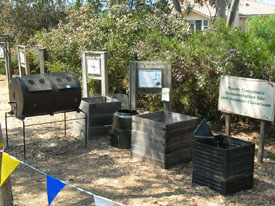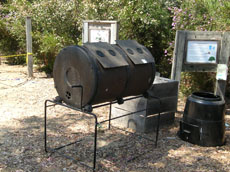
Fall is a time of transition in the garden. In cold regions, annual plants fade and the last of the deciduous leaves fall. In warm parts of the country, the summer garden makes way for fall crops. Regardless of where you live, debris from the yard and garden piles up and rather than discarding it and sending it to a landfill (which is banned in many places), it's a good time to build a compost pile.
Making compost is becoming more popular, even among urban gardeners, because it's a way to turn old plant material into a nutrient-rich, loose, well-draining, organic soil amendment — for free. Decomposition is a natural process, which we see in action when that pile of autumn leaves is greatly reduced in spring and nearly gone by summer. Organic material is broken down into smaller particles by earthworms, pill bugs, dung beetles, millipedes, beneficial bacteria, and other soil-dwelling organisms. Composting is simply a way of concentrating and speeding up the natural process.
Compost contains many of the essential elements for plant growth, as well as plenty of space to hold air and water for roots. The large, loose particles help improve soil structure whether you have sand or heavy clay. Of special importance for urban gardeners, compost helps to bind toxins like lead so they are not absorbed by plant roots. Compost also buffers the soil against pH extremes.
A compost pile should be easily accessible yet slightly out of the way. If the composting area is large, use shrubs or structures to screen it. Select a shady location or the sun will dry it out and slow the process. It should also be within reach of the garden hose so you can keep the pile moist. Finally, the ground should be level. If you can't meet all the conditions, the two most important ones are easy access and proximity to a hose.
What goes into the compost pile? Garden debris and kitchen waste such as leaves, stems, spent flowers, grass clippings, straw, corn husks, peels, rinds, apple cores, among other organic materials. Chop any hard or fibrous materials like corncobs, cornstalks, nutshells, and wood chips into smaller pieces to speed up decomposition. Avoid using large wooden branches (they decompose too slowly) and bones and animal fat (they attract animals). Avoid pet manure and kitty litter. Keep diseased plants out of the pile so they don't contaminate it.
Build your pile about 3 feet high and wide. Mix in both wet (green) and dry (brown) plant matter. For example, if adding fresh grass clippings (wet and green), add an equal amount of fallen leaves (dry and brown). Green material is usually plentiful throughout the season. Brown debris can be more difficult to find in spring and summer, so you may want to put some fallen leaves aside to mix into the compost pile next summer. Turn "greens" into "browns" by drying grass clippings. Sawdust (from untreated wood), wood chips, cocoa shells, and straw are some brown materials available year round.

It takes a few weeks to a few months to go from table scraps and plant debris to dark, rich compost. It all depends on the temperature, moisture, type of materials, and how much you turn the pile. You'll get faster compost if you keep the pile moist and turn it. Stirring or mixing the pile every two to three weeks keeps the pile well aerated, which speeds up decomposition and reduces odors. A stagnant pile takes a long time to make quality compost, and it can smell terrible.
If you have the space, allow room for two piles; that way, you can leave the first pile to decompose while you collect materials in the second pile. Once the compost from the first pile is used up, you start the process over by adding fresh material to the first one and using the second pile next.
Finished compost looks like rich, loose, woodsy soil. You can work it into the top layer of soil or spread it on the garden, where it protects the soil like mulch and also provides nutrients. There's also evidence that mulching with compost encourages more earthworm activity than mixing it into the soil (see Worms vs. Deep Tilling).
Urban gardeners with tiny lots can also make compost. Many small, unobtrusive composting units are available to get you started, including some with a rotating bin that greatly accelerates the process. For the do-it-yourselfers, a 3-foot by 3-foot pile will provide plenty of compost for the average urban garden.
Those in apartments and condos can still make quality compost for their potted plants by using indoor bins. Place bins under the sink (most convenient for kitchen scraps), in the garage, in the building basement, or in another dark, out-of-the-way place. As with outdoor composting, it's helpful to set up two bins: one with ready-to-use compost and one for adding scraps that will be ready later. Since there aren't likely to be many soil organisms under the sink, urban gardeners can speed up the process by ordering composting worms to break down the organic debris. There are lots of sites on the Internet that sell these worms (and instructions for keeping them productive).
Schools can use compost piles as a way to augment biology, chemistry, or ecology lessons. For younger kids, just making the pile can be an adventure. Older students can bring food scraps or plant waste from home, and then document the process as it turns their once-recognizable materials into garden gold that they can spread on the school garden. They gain a strong sense of accomplishment from turning banana peels and old leaves into the building blocks of next year's tomatoes. These experiences help create the next generation of environmentally conscious gardeners.
What's Your Composting Personality?